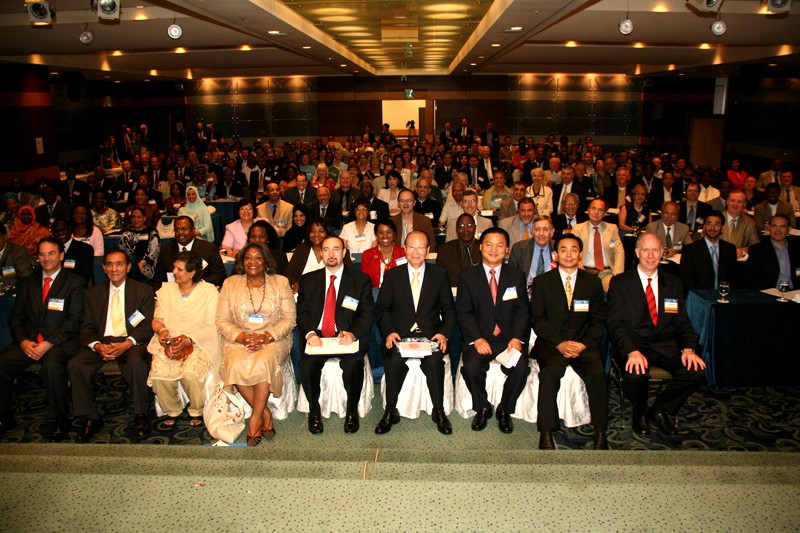
The Words of the Yamazaki Family
|
|
The Words of the Yamazaki Family |
New Paradigms And Projects For Peace
Hiroshi Yamazaki
July 24, 2007
Seoul, Korea
UPI Correspondent

Seven years into the new millennium, which many people hoped would be an era of peace, that dream is still a far cry from reality. Yet some groups are still relentlessly pursuing new and innovative paradigms for peace.
This was the theme of a unique international conference hosted by the Universal Peace Federation in Seoul, South Korea from July 17-20, with more than 300 participants including 20 senior diplomats as well as religious, academic and media leaders.
Most of the participants were from the United States, Britain and France -- the former Allied powers of World War II. According to the organizer, the New York-based Universal Peace Federation, a similar conference will be held next month with participants from the former Axis powers of Germany, Italy and Japan. This unusual grouping infers that current obstacles to world peace stem from certain limitations and contradictions inherent in the post-war regime.
One of UPF's diplomatic initiatives is the renewal of the United Nations, the primary post-war institution for international peace and security, set up initially by the former Allies. Among its proposed reforms, UPF has suggested that the United Nations create an Inter-religious Council that would include representatives from all the world's religions. This proposal was contained in a draft resolution submitted by the Philippines' U.N. representative, calling for inter-religious dialogue under U.N. auspices. The resolution was endorsed for further deliberation, according to Ricardo de Sena, UPF's director of U.N. Relations.
Global security is deeply affected by religious factors, as the current international Islamist jihad and the War on Terror demonstrate. Yet UPF's leaders see calls for violence as the political misuse of religion, which could be corrected if world religious leaders had a stronger international voice. The group does not hesitate to advocate diplomacy and global governance centering on faith in God and spiritual reality.
"When the world is facing problems whose solutions are so elusive through political, economic or military means, people have become desperate to look for value-oriented options, including religion," said Jack Corley, assistant secretary-general of UPF.
Dr. Thomas Walsh, UPF secretary general, sees religions as "drawing people and their conduct to a higher reality, higher principles and higher calling."
Mohammed Idrees of the Birmingham City Council in Britain, agreed with the idea of seeking to involve religious leaders in peace processes. "No religion preaches hatred," he pointed out.
Not everyone agrees that this approach is feasible, however. Dr. Hamid Al Bayati, Iraq's ambassador to the United Nations, cautioned, "There are member states which are against religious inclusion, such as the European Union. This proposal may be realized outside the U.N. system." He said he would welcome in principle any UPF initiative applicable to the ongoing conflict in his country.
In his opening remarks, Dr. Hyun-Jin Preston Moon, vice chairman of UPF, questioned the validity of the strict separation of values between people's private lives and public affairs. He pointed out that the majority of humanity is committed to a religious belief, while nations follow strictly secular processes in decision making. He also suggested that the United Nations should hold a referendum on revising the U.N. Charter to include a reference to God. (Moon is the third son of UPF founder Rev. Sun Myung Moon, who also established News World Communications Inc., which owns UPI.)
Under the theme "Providing Vision and Leadership at a Time of Global Crisis," participants discussed the deadlocks in peace-building in East Asia and the Middle East, and proposed new ways of addressing these conflicts.
UPF has organized a global alliance of individuals called Ambassadors for Peace - many of them former government officials, politicians and diplomats -- who are dedicated to world peace based on faith, family and harmonious cooperation beyond national or religious boundaries. More than one-third of the Seoul conference participants consisted of such "ambassadors."
During a discussion session, an African participant, referring to the 200th anniversary of the termination of slavery this year, suggested that Africans should be taking part in projects for peace rather than merely celebrating this anniversary.
One of UPF's peace projects -- which the participants, particularly those of the Muslim faith, overwhelmingly endorsed - is the Middle East Peace Initiative, which takes diverse groups of people to Israel and Palestine on fact-finding and reconciliation tours, providing a forum for dialogue and reconciliation in one of the world's hot spots.
The MEPI project has already brought tens of thousands of people of many religions and nationalities to the area to meet with deputies and high officials on both sides of the conflict, including the late Yasser Arafat.
In the midst of constant fear of Palestinian suicide bombers and the persistent division created by Israel's 700-kilometer wall, MEPI has persistently advocated a peaceful solution based on recognition of the common brotherhood between believers in the Abrahamic faiths of Judaism and Islam.